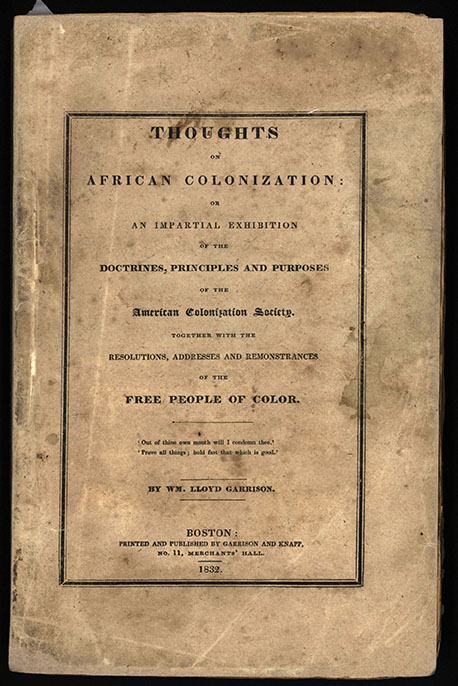The Frederick Douglass Game
William Lloyd Garrison
What follows is a summary and biography on historical figure William Lloyd Garrison. Born in 1805 in Massachusetts, Garrison was born into a very poor family, having to work for everything he wanted in life. By the age of 13, he began working for his first job at the Newburyport Herald gaining experience as a writer and editor. From there, he decided he wanted to be part of the Abolition Movement at age 25 where he decided to join the American Colonization Society. What were William Lloyd Garrison's views on slavery and what did the rest of his life look like as a result?

"My name is William Lloyd Garrison. In 1805, I was born in Massachusetts to my mother and father who were living in poverty. By my teenage years, I began working for a newspaper called Newbury Herald which sparked my interest in writing and editing. From there I joined the Abolitionist Movement and became part of the American Colonization Society. When slavery first came to be, I immediately knew I was against it. In fact, that was why I joined the American Colonization Society, however I quickly realized their ideals were not the same as mine and I eventually left the group. At first, like myself they were anti-slavery, promoting the freedom of blacks, but like much of society, many of them really believed in reducing the number of free blacks in this nation. I organized what became known as the New England Anti-Slavery Society in 1832 and helped found the American Anti-Slavery Society. I came to believe that colonization was a catalyst of the paralysis of the anti-slavery movement which I spoke about that year in Thoughts on African Colonization. This is what kickstarted the rest of my career as a strong-willed abolitionist.

After some further exploration with some other papers, I started my own paper, The Liberator, first published January 1, 1831. Now, before I continue, let me make clear my views on the disgusting acts we call slavery. I fully believe in the immediate emancipation of all slaves with NO compensation to slaveholders, all blacks being freed completely and allowed to become a part of society as equals. They, too, are entitled to the country’s life, liberty and happiness! I was never quiet about the way I felt about slavery, in fact I made sure to make my voice heard in every issue of my paper. Because of this I was often attacked, both verbally and physically, lynched, but why would I ever let that slow me down? I prefer to be nonviolent unlike those radicals. Talking to the people and discussing my views allows me to persuade them just as well. Though I did use verbal persuasion, this also became written persuasion which had me imprisoned many times for a few of my writings. I was jailed, indicted for “the provoking of slave revolts” and even had some offered large sums of money for my capture and murder. None of it ever slowed me down.
A major problem here is our very own Constitution. When you really read it and understand its points, you can clearly see it is a proslavery document! Apparently this was not much of a shared view as I became alienated from politics almost entirely because of that point I made. And so then I simply refused to vote until the government sanctioned slavery. It was at this time I discovered a dear colleague of mine who had just escaped in Massachusetts. He and I were able to join together to go around and speak to people while he shared his experiences in order to try to influence more to believe in the emancipation of slaves and the abolishment of slavery! I found that Douglass believed just as I did. Neither of us went to show our support of the Civil War until the Emancipation Proclamation came out in 1863. However, while the release of this document should have been a positive, it seemed to not fully be so.
Frederick and I found that after the publishing of this document, the people showed their opinions loud and clear that they did not believe in achieving equality among races, as we had been trying to persuade them. Rather, they seemed to discriminate against them even more at times. As time went on, people adjusted to the idea of blacks being equals in our society and things started to get a little better in our society. Forever with few dollars in my pocket, I spent 35 years continuing to voice my opinions loud and clear in my paper all the way until the 13th amendment came to be and they finally abolished slavery in 1865. While we are nowhere near finished in making this country an equal place, I’d say this is a great start."
Sources:
https://www.pbs.org/wgbh/aia/part4/4p1561.html
https://www.nationalabolitionhalloffameandmuseum.org/william-lloyd-garrison.html
https://www.nps.gov/people/william-lloyd-garrison.htm
http://www.crusadeforthevote.org/garrison
https://www.britannica.com/biography/William-Lloyd-Garrison
No comments:
Post a Comment